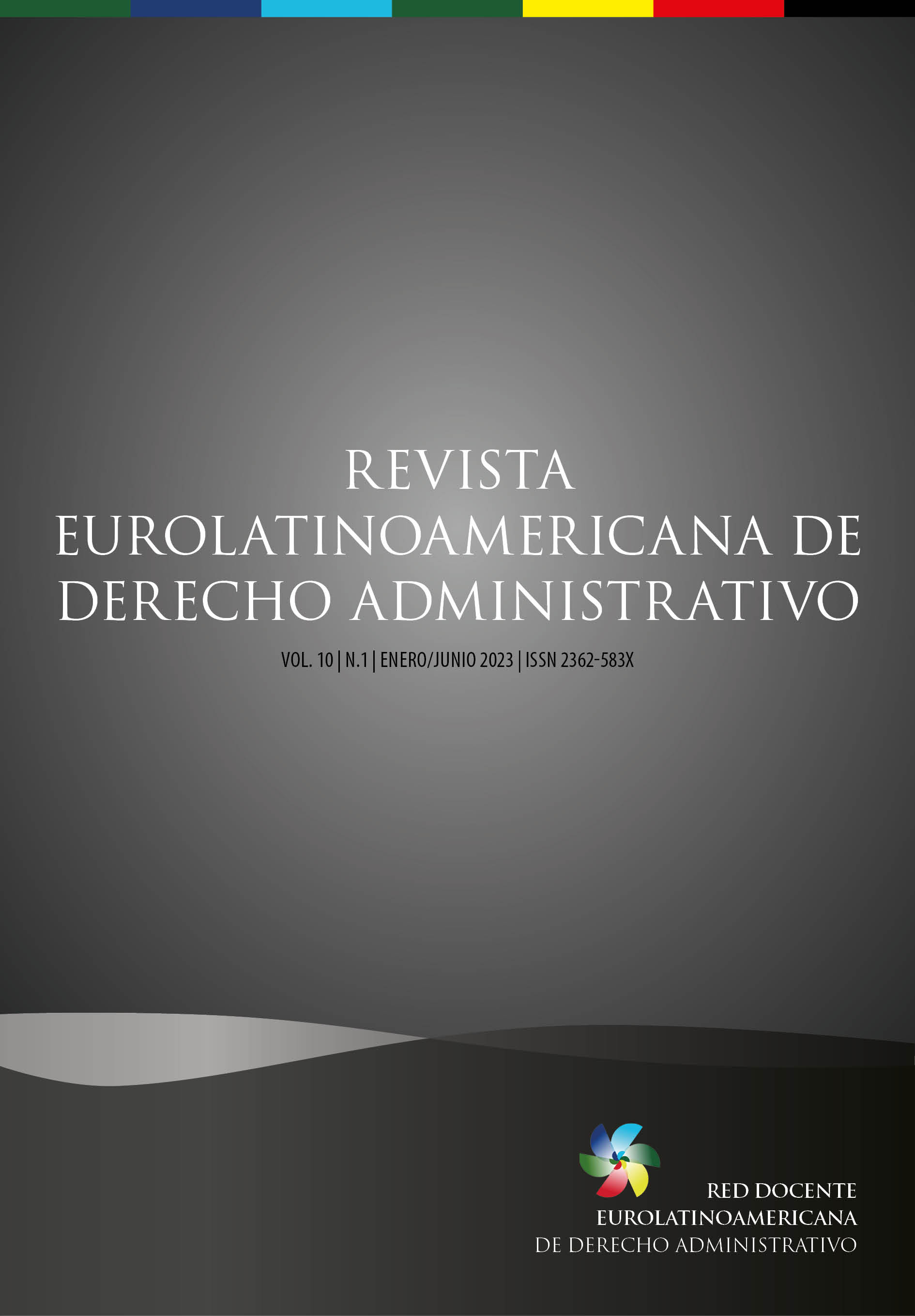The constitutional control of administrative appeals in Chile
DOI:
https://doi.org/10.14409/redoeda.v10i1.12941Keywords:
constitutional control, administrative appeals, due process, administrative procedures, administrative control.Abstract
Based on the dogmatic method and the case law review, the purpose of this paper is to analyze the constitutional control of administrative appeals in Chile. In this context, this paper demonstrates that the absence of express provisions has not prevented the Constitutional Court from verifying the constitutionality of the laws that develop such challenge-related mechanisms. However, such control presents significant differences depending on whether it is exercised in a preventive or repressive manner. In the preventive variant, on the one hand, the examination of administrative appeals has been strictly formal, limited to verifying quorums for legislative approval. In the repressive variant, on the other hand, the review of these mechanisms has been extended due to the substantial nature of the criteria applied.
References
AYLWIN, Arturo, Principios de la ley orgánica de la administración del Estado y pautas para el análisis de su Título I, Revista chilena de Derecho, Santiago, n. 2, p. 395-422, 1989.
BENAVIDES, José Luis y OSPINA, Andrés, La justificación de los recursos administrativos, Revista Derecho del Estado, Bogotá, n. 29, p. 73-105, 2012. Disponible en: https://revistas.uexternado.edu.co/index.php/derest/article/view/3293.
BOCKSANG, Gabriel. Siete distorsiones categoriales en el régimen recursivo del derecho administrativo chileno. En: DELGADO, Jordi y NÚÑEZ, Raúl (coordinadores). Recursos procesales – Problemas actuales. Santiago: Der Ediciones, 2017, p. 537-565.
CAMACHO, Gladys. Un examen con enfoque garantista de los recursos administrativos. Revista de Derecho Público, Santiago, n. 94, p. 51-68, 2021. Disponible en: https://revistaderechopublico.uchile.cl/index.php/RDPU/article/view/64242.
CORVALÁN, Juan Gustavo. Agotamiento de la vía administrativa versus tutela judicial efectiva (hacia una modulación razonable del acceso a la justicia). Boletín mexicano de Derecho comparado, Ciudad de México, n. 135, p. 1111-1135, 2012. Disponible en: https://www.scielo.org.mx/pdf/bmdc/v45n135/v45n135a7.pdf.
FERRADA, Juan Carlos. El sistema de justicia administrativa chileno: revisión de la legalidad de actos administrativos o protección de derechos y/o intereses. Revista de Derecho, Valdivia, n. 1, p. 103-126, 2012. Disponible en: https://www.scielo.cl/pdf/revider/v25n1/art05.pdf.
FERRADA, Juan Carlos. Los procesos administrativos en el Derecho chileno. Revista de Derecho, Valparaíso, n. 36, p. 251-277, 2011. Disponible en: https://www.scielo.cl/scielo.php?pid=S0718-68512011000100007&script=sci_abstract.
FLORES, Juan Carlos. Revisión del acto administrativo: Recursos administrativos, invalidación, revocación, caducidad y decaimiento. Santiago: Der Ediciones, 2023.
HARRIS, Pedro. El control asimétrico de los actos de la Administración. Revista de Derecho Coquimbo, Coquimbo, n. 29, p. 1-23, 2022. Disponible en: https://revistaderecho.ucn.cl/index.php/revista-derecho/article/view/3951/4206.
HARRIS, Pedro. La impugnación administrativa en la nueva ley migratoria chilena. Revista de Derecho PUCP, Lima, n. 89, p. 205-228, 2022. Disponible en: https://revistas.pucp.edu.pe/index.php/derechopucp/article/view/25172/24607.
HUNTER, Iván. La desviación procesal en el contencioso administrativo ambiental chileno. Revista de Derecho ambiental, Santiago, 16, p. 271-304, 2021. Disponible en: https://revistas.uchile.cl/index.php/RDA/article/view/64848.
NAVARRO, Enrique. Presupuestos de admisibilidad de la acción de inaplicabilidad. Revista de Derecho Público, Santiago, n. 72, p. 265-293, 2010. Disponible en: https://revistaderechopublico.uchile.cl/index.php/RDPU/article/view/37708.
PARADA, Ramón. Derecho administrativo II – Régimen jurídico de la actividad administrativa. Madrid: Ediciones Académicas, 2017.
PICA, Rodrigo. El carácter concreto del control de inaplicabilidad por inconstitucionalidad de la ley en el Derecho chileno. Revista de Derecho (Coquimbo), Coquimbo, n. 2, p. 101-136, 2009. Disponible en: https://revistaderecho.ucn.cl/index.php/revista-derecho/article/view/1846.
PINOCHET, Francisco. El recurso de protección – Estudio profundizado. Santiago: El Jurista, 2020.
RUIZ, Francisco. El proceso contencioso administrativo. Madrid: Thomson Reuters, 2022.
SALAS, Ricardo. Una reconstrucción dogmática de la inaplicabilidad por inconstitucionalidad, Estudios Constitucionales, Talca, n. 1, p. 187-226, 2018. Disponible en: https://www.scielo.cl/pdf/estconst/v16n1/0718-5200-estconst-16-01-00187.pdf.
TARDÍO, José Antonio. El procedimiento ordinario. En: GONZÁLEZ-VARAS, Santiago y TARDÍO, José Antonio (directores). La Ley de Jurisdicción Contencioso-administrativa: sus cuestiones más actuales. Madrid: Thomson Reuters, 2021, p. 39-48.
VALDIVIA, José Miguel. Manual de Derecho Administrativo. Valencia: Tirant lo Blanch, 2018.
ZÚÑIGA, Francisco y OSORIO, Cristóbal. Los criterios unificadores de la Corte Suprema en el procedimiento administrativo sancionador. Estudios Constitucionales, Talca, n. 2, p. 461-478, 2016. Disponible en: https://www.scielo.cl/scielo.php?script=sci_arttext&pid=S0718-52002016000200015.
ZÚÑIGA, Francisco. Acción de inaplicabilidad por inconstitucionalidad: requerimiento de jueces entre legalidad y constitucionalidad. Revista de Derecho Público, Santiago, n. 72, p. 294-339, 2010. Disponible en: https://revistaderechopublico.uchile.cl/index.php/RDPU/article/view/37710.
Downloads
Published
How to Cite
Issue
Section
License
Copyright (c) 2023 Pedro Harris Moya

This work is licensed under a Creative Commons Attribution 4.0 International License.
Authors who publish in this Journal agree to the following terms:
- Authors retain copyright and grant the Journal of Constitutional Research the right of first publication with the article simultaneously licensed under the Creative Commons - Attribution 4.0 International which allows sharing the work with recognition of the authors and its initial publication in this Journal.
- Authors are able to take on additional contracts separately, for non-exclusive distribution of the version of the paper published in this Journal (eg.: publishing in institutional repository or as a book), with a recognition of its initial publication in this Journal.
- Authors are allowed and encouraged to publish their work online (eg.: in institutional repositories or on their personal website) at any point before or during the submission process, as it can lead to productive exchanges, as well as increase the impact and the citation of the published work (see the Effect of Open Access).



























.png)





